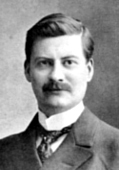Sir Charles Eliot
‘His pet hobby is the study of nudibranchs or sea slugs. Never more closely did a man resemble the objects of his hobby.’ Who could this be describing? Surprisingly, it was the first Governor, or Commissioner as it was called then, of the East Africa Protectorate (later named Kenya and Uganda). This was Sir Charles Eliot, born on 8 January 1862, son of a clergyman, unmarried, donnish, learned and utterly out of touch with the world. He had a vision: ‘He envisaged a thriving colony of thousands of Europeans with their families, the whole of the country from the Aberdares and Mt. Kenya to the German border divided up into farms; the whole of the Rift Valley cultivated or grazed, and the whole country of Lumbwa, Nandi to Elgon and almost to Baringo under white settlement. He intends to confine the natives to reserves and use them as cheap labour on farms. I suggested that the country belonged to Africans and that their interests must prevail over the interests of strangers. He would not have it; he kept on using the word ‘paramount’ with reference to the claims of Europeans. I said that some day the African would be educated and armed; that would lead to a clash. Eliot thought that that day was so far distant as not to matter and that by that time the European element would be strong enough to look after themselves; but I am convinced that in the end the Africans will win and that Eliot’s policy can lead only to trouble and disappointment.’
The prescient writer of this description was Richard Meinertzhagen, later unmasked as a fantasist, but in this case utterly correct. Eliot quarrelled with the Foreign Office over the huge grants of land he was allocating, calling their argument that this infringed Africans’ rights ‘ridiculous.’ He also thought that farming and big game could not co-exist and one should not be sentimental about the animals. But he was a clever man – achieving a first in Greats at Balliol, winning prizes for essays in Sanskrit, Syrian and other languages. After joining the diplomatic service he was sent to St Petersburg where he learnt Russian in two months and published a grammar of Finnish (a notoriously difficult language). In Tangier he mastered Arabic, in Constantinople Turkish. This man with a flypaper memory could have been a successful Governor had he been willing to compromise, but instead he resigned in pique when the Foreign Office opposed his views about granting land to Europeans.

Sir Charles Eliot
His career, however, was certainly not at an end. He became Vice-Chancellor of Sheffield University (1905-1912) and then Principal and Vice-Chancellor of the University of Hong Kong (1912-1918), He was British High Commissioner in Siberia (a nicely distant place where he was unlikely to commit his Kenyan indiscretions), and subsequently Minister Plenipotentiary to Japan, where the Japanese would keep him in check. He wrote many learned books, among them The East Africa Protectorate, but doubtless his favourite publications were his numerous articles with titles like ‘On Some Nudibranchs from East Africa and Zanzibar,’ ‘On the Nudibranchs of Southern India and Ceylon,’ ‘Nudibranchs of the Indo-Pacific,’ ‘Nudibranchs from New Zealand and the Falkland Islands,’ and so on.
One of his obituary notices said of him: ‘Eliot could be brilliant and vivacious in conversation when he found himself in congenial company, but he did not suffer fools gladly. He was wholly free from race prejudice [this certainly did not apply to Africans], and had a genuine liking for the many Asiatic peoples with whom his interests or duties brought him into contact. lf the Japanese came first in his estimation and affections, the Chinese were not far behind, and for Indian achievements in philosophical and religious speculation and in poetry he had a warm appreciation. He was a loyal friend and a charming correspondent.’ His illustrious career came to an untimely end when he died at sea on a voyage between Penang and Colombo, on 16 March 1931. There was no Christian priest on board the Japanese ship, and the Japanese captain, who clearly knew something of Eliot’s intense interest in Buddhism, decided that his body should be committed to the sea in accordance with Buddhist rites ordinarily observed on such occasions. It was a simple and impressive final ceremony for this great scholar and indifferent diplomat.

Recent Comments